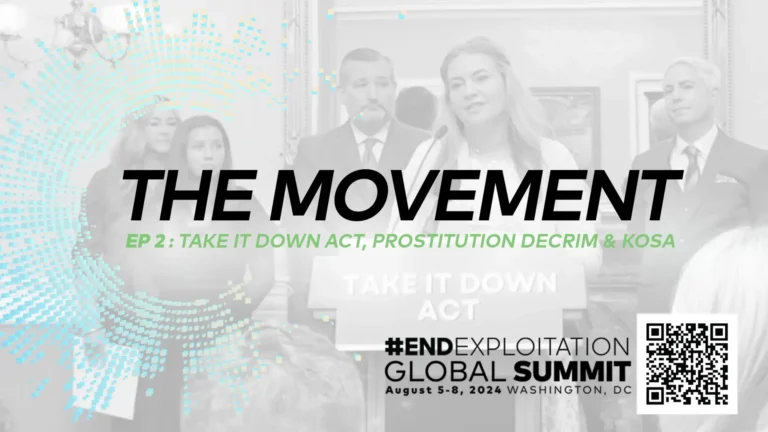The National Center on Sexual Exploitation is pleased to present the Corporate Leadership Award to Bumble, a popular woman-founded, woman-led dating app. We recognize Bumble for their leadership in fighting against the unsolicited sending of sexual images – a growing form of online sexual harassment known as “cyberflashing.”
Thank you @bumble for fighting online sexual harassment and pushing others to do the same by raising industry standards and working with legislators to pass much-needed laws against cyberflashing! #EndExploitation #CESESummit Share on X @bumble listens to women and supports survivors! Thanks, Bumble, for blocking unwanted sexually explicit images and fighting for laws against online sexual harassment. #metoo #EndExploitation Share on X Sending unwanted pictures of your privates is not sexy. It’s sexual harassment. Thank you @bumble for making this clear by blurring cyberflashing attempts #metoo #EndExploitation Share on XBumble accepted the Corporate Leadership Award, saying:
At Bumble, we put safety at the heart of our platform from the very beginning and continuously invest in innovative features that help cultivate a safe, healthy environment for our community. From being one of the first apps to launch photo verification to reduce catfishing, to launching and open sourcing Private Detector to help reduce unsolicited lewd images, we have remained committed to combating online sexual harassment.
More broadly, we saw cyberflashing as a problem that plagued a majority of women, and as a company that encourages safe connections, we knew we had an opportunity to garner change.
Fill out this quick action form to ask for cyberflashing to be made a crime in your state!
Bumble Backs Anti-Cyberflashing Legislation
“If flashing is illegal on the street, it shouldn’t be tolerated in your inbox.”
This is what Bumble concluded after a study they commissioned found that one in three women using the Bumble dating app reported having received unsolicited sexual images. Of these women, 96% were unhappy to have been sent these images. In other words: women were distressed to be receiving pictures of men’s privates in their messages – and woman-founded, women-led Bumble listened to their users and took this problem seriously. As they began investigating solutions, the Bumble team realized that there were no laws in the U.S. prohibiting cyberflashing, even though laws existed to prohibit similar behavior offline. As Bumble wrote in a public statement, “While it’s a crime to pull your pants down in the streets, there was nothing stopping anyone from exposing themselves in your DMs, texts, or other channels.”
Since 2018, Bumble has been campaigning and working with legislators to resolve this gap in U.S. law. Thanks to their work, the state of Texas passed a law criminalizing cyberflashing in 2019, the state of Virginia followed suit in April 2022, and the state of California passed a law in September 2022 which would allow victims of cyberflashing to sue the perpetrator for damages.
Bumble Pursues Corporate Solutions to Cyberflashing
In addition to backing legislation, Bumble has taken truly industry-leading steps to combat cyberflashing at the level of corporations.
In 2019, they added a new feature to their app, called the “Private Detector”, which detects and automatically blurs nude images by default. The recipient is then informed that they’ve received something potentially inappropriate and can decide whether to view or block the image.
Further, in October 2022, Bumble released an open-source version of its Private Detector, so that other tech companies could use and adapt the technology as well. Bumble stated, “It’s our hope that the feature will be adopted by the wider tech community as we work in tandem to make the internet a safer place.”
Detecting and blurring unsolicited nude images is a common-sense feature that should be standard across all tech platforms and products. NCOSE has long been advocating for social media companies to implement this feature, particularly when the sexually explicit images are being sent to children. But aside from Apple, which only blurs sexually explicit images for minors IF parents activate this feature, no other corporation that we are aware of proactively blurs sexually explicit images. If Bumble can add this feature to protect adults, there is no reason why larger tech companies with far more resources cannot at the very least add this feature for children – especially when Bumble has already provided them with the technology needed to do this.
By implementing and open-sourcing the Private Detector, Bumble has set a new industry standard, showing other corporations what can and should be done to protect online users from sexual harassment. It is also shifting norms in a society where cyberflashing is generally not taken seriously or just considered an unfortunate part the internet. For those exposing themselves, it’s often a form of exerting power that so far has gone largely unpunished. Bumble is sending the message loud and clear that it is not acceptable to expose yourself to someone without their consent, whether online or offline, and that in truth it should be a crime.
We warmly commend Bumble for prioritizing the safety and well-being of its users over profit, shifting cultural norms through tech-advances and legislative efforts, and call on other corporations to follow their lead!
Bumble Supports Survivors
In addition to working to end cyberflashing, Bumble also offers support to survivors of sexual assault and abuse. Bumble partners with Chayn, a global non-profit run by survivors and subject matter experts, to offer a free online trauma support program to survivors in its dating community. This program was launched in 2020 “as a response to the pandemic and the knowledge that not only were many survivors’ experience worsened as they were home alone with their abuser, but those recovering from assault were left stranded from their usual therapy and support systems.” To our knowledge, Bumble is the first online dating app to provide this kind of free support to survivors.
We are grateful to woman-led Bumble for recognizing the needs of survivors and women in its community and developing resources to provide them with crucial support!





